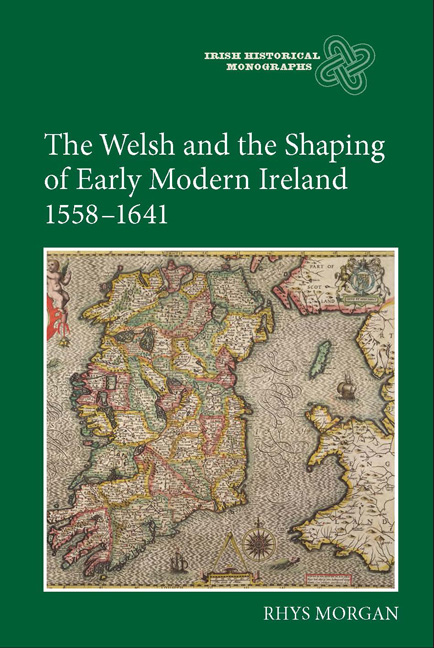Book contents
- Frontmatter
- Dedication
- Contents
- List of illustrations
- Acknowledgements
- Abbreviations
- Introduction: Locating the Welsh in Ireland and Britain during the early modern period
- Part I From soldier to settler
- 1 ‘Soldiers of Wales’: the Welsh presence in the Irish army, 1558–1641
- 2 Servants and soldiers: Welsh involvement in the Irish administration, 1558–1641
- 3 The Welsh plantations, 1558–1641
- Part II The New Welsh
- Conclusion
- Appendices
- Bibliography
- Index
3 - The Welsh plantations, 1558–1641
from Part I - From soldier to settler
Published online by Cambridge University Press: 05 November 2014
- Frontmatter
- Dedication
- Contents
- List of illustrations
- Acknowledgements
- Abbreviations
- Introduction: Locating the Welsh in Ireland and Britain during the early modern period
- Part I From soldier to settler
- 1 ‘Soldiers of Wales’: the Welsh presence in the Irish army, 1558–1641
- 2 Servants and soldiers: Welsh involvement in the Irish administration, 1558–1641
- 3 The Welsh plantations, 1558–1641
- Part II The New Welsh
- Conclusion
- Appendices
- Bibliography
- Index
Summary
This chapter addresses how the Welsh joined the colonial community in Ireland as settlers. The period between 1558 and 1641 witnessed an acceleration in attempts to plant Irish land with settlers from England, Scotland, Wales and elsewhere. The chapter assesses the scale of Welsh involvement in these plantation schemes, and presents a picture of the nature and form of Welsh settlement in Ireland and how this changed over time. It provides the first study of Welsh settlers in Ireland, and completes the broader prosopographical analysis of the Welsh in the Irish colonial community. An often-overlooked Welsh presence can be found in almost all parts of the Irish plantations. The involvement of the Welsh ranged from influential landowners to their settlers and tenants. Some were new arrivals, migrating to Ireland to take advantage of cheap land and rents, but many more were soldiers and military officers. These military and civilian settlers created a permanent Welsh presence in Ireland, and formed the nucleus around which a Welsh community emerged in the early seventeenth century.
This chapter is also the first significant study of settlers in Ireland to employ regional origin as its organising principle. Most analyses of the Irish plantations have treated English and Welsh settlers as a single coherent group. It is argued here that a more accurate and complex picture of settlement in Ireland can be constructed by taking into account the importance of regional origin to their political, social and economic lives.
- Type
- Chapter
- Information
- The Welsh and the Shaping of Early Modern Ireland, 1558–1641 , pp. 73 - 104Publisher: Boydell & BrewerPrint publication year: 2014



